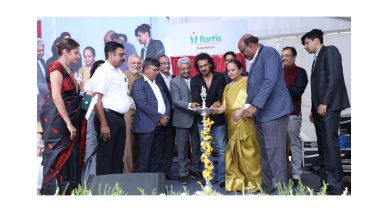World Health Parliament 2021 virtual conference concludes

This year’s theme was pioneering disruptive reforms in the healthcare ecosystem and Atmanirbhar Bharat
The World Health Parliament (WHP) 2021, a four-day virtual conference organised by MIT World Peace University (MIT-WPU), the Vishwaraj Hospital and the MIT-WPU School of Pharmacy, recently concluded. The conference witnessed more than 66 speakers in 10 sessions and was attended by more than 7,588 participants.
The four-day virtual conference was attended by Rajesh Tope, Minister of Health, Government of Maharashtra, Amit Deshmukh, Minister of Medical Education, Cultural Affairs, Government of Maharashtra and Guardian Minister, Latur, Dr Sanjay Oak, Chairman of Taskforce for COVID-19, Government of Maharashtra, Dr Tatyarao Lahane, Director, Directorate of Medical Education & Research (DMER), State of Maharashtra & Head, Maharashtra State’s AYUSH Task Force, Dr Anbumani Ramdoss – Member of Parliament Rajya Sabha, Former Minister of Health and Family Welfare, Government of India, Dr Mani Kumar Sharma, Minister for Health and Family Welfare, Government of Sikkim, Dr Praveen Togadia, cancer surgeon, Naba Kishore Das, Minister of Health and Family Welfare, Government of Odisha along with the other dignitaries.
This year’s theme was pioneering disruptive reforms in the healthcare ecosystem and Atmanirbhar Bharat which covered different topics like India’s response to COVID-19, pitfalls and perils in India’s healthcare, disruptive reforms in medical education, improving capability and reach of paramedic services, the role of public and private sectors etc. The conference also discussed medical research, global experience and regulatory reforms in the health sector. The discussion was insightful and the need to scale up the healthcare system with the help of newer technical innovations was highlighted.
Speaking at the forum, Tope said, “I would like to compliment MIT World Peace University for organising this relevant programme to discuss with the stakeholders to overhaul the healthcare ecosystem. I express my sincere gratitude to all the COVID warriors and I am proud to acknowledge that Maharashtra now is in a much more comfortable state – active cases are less and recovery rates have improved drastically. We need to keep following the sanitization, masking and social distancing norms.”
He further added, “We were in a very challenging situation with one of the highest rates in India – numbers were exponentially increasing in Maharashtra and the number of beds in our hospitals was very less. We took steps that many states did not follow. We collaborated with the private sector players and would like to thank them for their cooperation during the pandemic. I would like to thank all the private players who really cooperated in this pandemic situation. Secondly, the affordability of this treatment was also a challenge – we were given a cap on the bills. The testing procedure also became affordable. Even other medical procedures such as CT scans and masks were capped with an affordable price, keeping in mind the poor and economically backward people. The virus was contained even in Dharavi, the largest slum in Asia inhabiting about 20 lakh people. I truly salute our healthcare workers who helped us in containing this virus.”
Speaking about the new vaccine, he shared, “The vaccine has come – we have vaccinated more than a lakh in just four days and are vaccinating more than 25,000 people in just a day following the guidelines of the Government of India. I would like to appeal to everyone and ask them to be optimistic about the vaccination and request them to get vaccinated on their terms.”
Rahul V Karad – Managing Trustee & Executive President, MAEER’s MIT and Executive President, MIT World Peace University, said, “The COVID-19 pandemic has brought back the focus on the necessity for healthcare reforms in the country. The global pandemic has generated the need for a self-reliant healthcare infrastructure system in the country. At present, there was a need for different stakeholders and policymakers to come to a common platform to overhaul the medical ecosystem for the betterment of human wellbeing. The concept behind this year’s World Health Parliament was to create a forum where stakeholders could come together to discuss, deliberate, resolve and design strategies to change the country’s healthcare ecosystem.”
Dr Oak said, “I am delighted that MIT-WPU has organised a global conference on public health and education to encourage research and innovation in the healthcare sector. Today, a completely revolutionary approach, supported by strong governance and regulatory reforms, is required to make the country ‘Atmanirbhar’ in the healthcare sector. A fundamental transformation of the healthcare environment is required, beginning with research in medical education, technological intervention and the healthcare delivery system. Also, research in the area of medicine needs disruptive reforms and the ecosystem needs to be robust for the healthcare facility to be affordable and accessible to the citizens.”
The conference was conceptualised and convened under the leadership of educationist, Rahul V Karad and organised by Dr Aditi R Karad, Executive Director, Vishwaraj Hospital Member Trustee and Joint Secretary General, MAEER’s MIT, Pune, Dr Bhanudas S Kuchekar, Dean, School of Pharmacy, MIT-WPU, Dr B Janaki Ram, Medical Director, Hospital and Health Care Management, Vishwaraj Hospital, Pune, Dr NT Rao, Vice-Chancellor, MIT-WPU, Prof DP Apte, Former Pro-Vice-Chancellor, MIT-WPU and Dr Ravindranath Patil, Senior Director, MIT-WPU.




